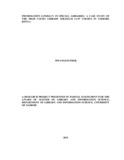| dc.description.abstract | Information literacy plays an important role in everyday life because it involves a combination of education, work-related tasks, social associations and socio-technical practice. Information-literate person can determine and retrieve the information needed, which can lead to personal empowerment. Information literacy can enable a person to interpret information, question its validity and apply information to the workplace and real world environments. Sorting and filtering out relevant information are also important skills of an information-literate person. If people do not know where to look for information, they can spend hours per week obtaining, reviewing and analyzing information and still not find the right information they need. Lack of information literacy skills could cost any institution millions. This study sought to investigate information literacy in special libraries with focus to high court library Milimani Law courts in Nairobi, Kenya. The study was guided by the following specific objectives, that is, to find out whether there is a library policy which regulates access to information by the high court library users, to establish whether the library users have information literacy skills necessary to access and use information resources effectively, to suggest strategies to be adopted in enhancing IL skills of library users using the high court library and to identify the challenges experienced in the provision of information literacy skills to the library users at the high court. The target population of this study was the users and library staff of the High Court Library. The study relied on primary data sources. The study employed a non-probability sampling technique in coming up with a sample size of 112 respondents. The study generated both qualitative and quantitative data where quantitative data was coded and entered into Statistical Packages for Social Scientists (SPSS Version 17.0) and analyzed using descriptive statistics. The study found out that the high court library did not have a policy governing provision of information literacy. The study also found out that the high court library did not provide information literacy trainings to the library users. The study established that training was the best possible method for the provision of adequate, suitable and appropriate information literacy to the library users. The study also established that some of the users were not conversant with the use of information communication technolog | en_US |

